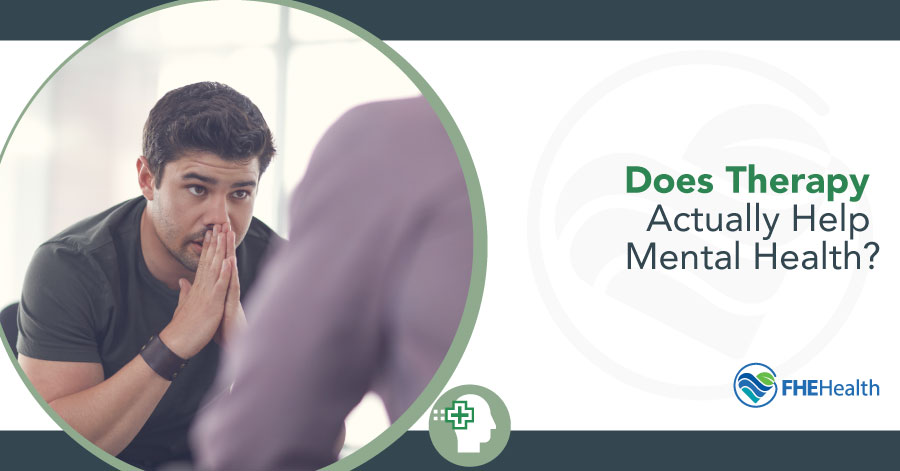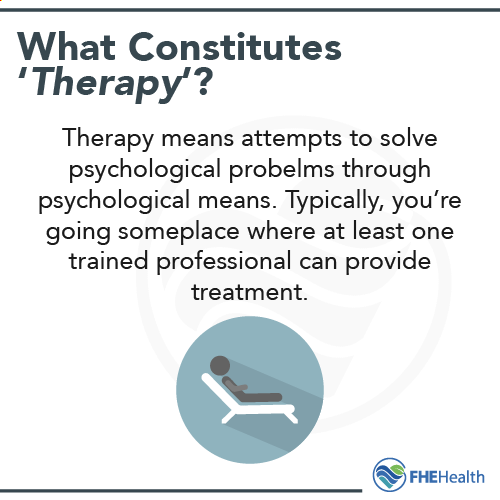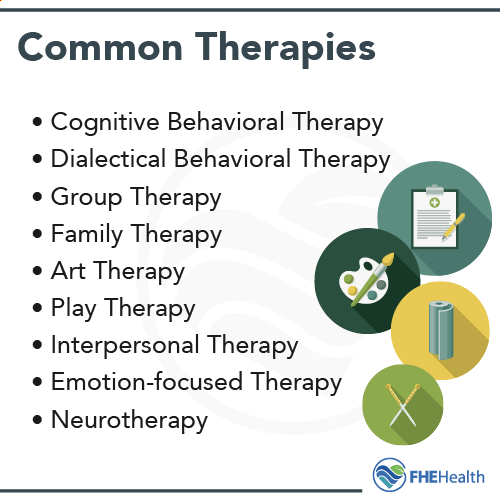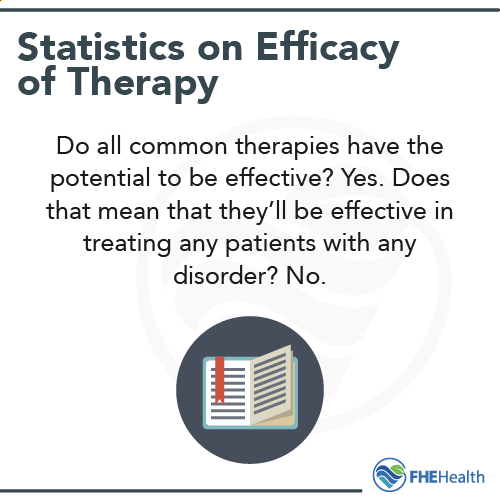
Most people’s conceptions and opinions of mental health and “therapy” happen in the theoretical plane. People with mental health conditions like depression and anxiety will see their peers achieve success from one type of therapy or another, and either decide whether to try it themselves or not. A lot of people who decide not to seek therapy themselves often come up with the same reason: “therapy won’t work for me,” or just that “therapy doesn’t work” in general.
If this is true, it’s a fair opinion to hold. After all, no one wants to waste their time and money on something that’s doomed from the start to have little effect. But the fact is, most strategies for recovery are evidence-based therapies, which means they’re developed and refined on real cases of people benefiting from them. Mental health and therapy of all kinds can be tricky on a case-by-case basis, but by and large, there’s a lot of evidence supporting that therapy does actually work and has significant effects on mental health.
In this piece, we aim to explore some of the most common therapy methodologies, their effectiveness, whether some are more effective than others, and how to find a modality that works to help with your specific diagnosis.
What Is Therapy in Mental Health?
 In broad terms, therapy is an attempt to heal or relieve a diagnosed condition. People with cancer undergo chemotherapy and radiation therapy. Someone who goes to a spa might be looking for help via massage therapy. Therapy, ultimately, is a way of describing methodologies used to treat and resolve underlying issues, whether those be physical, mental, emotional, or other.
In broad terms, therapy is an attempt to heal or relieve a diagnosed condition. People with cancer undergo chemotherapy and radiation therapy. Someone who goes to a spa might be looking for help via massage therapy. Therapy, ultimately, is a way of describing methodologies used to treat and resolve underlying issues, whether those be physical, mental, emotional, or other.
In the context of mental health and therapy specifically, therapy means attempting to solve psychological problems through psychological means. This means that while pharmacotherapy is an emerging modality for addiction and mental health, the use of medications doesn’t fit into the modern discussion of what therapy is for people who have mental health conditions.
If you’re seeking therapy in the mental health space, you’ll most likely be cared for by a trained professional with a focus on specific mental issues. The provided care will generally involve talking through the issues, but this may be a variable percentage of the treatment time, with this talking phase making up more or less of the therapy session time.
What Are The Most Common Therapies to Improve Mental Health?
 In the past, there was basically one type of therapy: psychotherapy. This was all-encompassing, and it meant that it was rare for two people’s experiences in therapy to differ. For some patients who need some slight modification to “talk therapy” to get results, this can be frustrating, as the talk therapy may not be able to address underlying issues like chemical imbalances.
In the past, there was basically one type of therapy: psychotherapy. This was all-encompassing, and it meant that it was rare for two people’s experiences in therapy to differ. For some patients who need some slight modification to “talk therapy” to get results, this can be frustrating, as the talk therapy may not be able to address underlying issues like chemical imbalances.
In the 1990s, the field of psychotherapy began to take a more stringent approach to therapies offered using a new practice of viewing therapy empirically and developing evidence-based practices (EBPs). This led to more tailored methods within the larger field of psychotherapy being studied and analyzed for efficacy. As a result, some types of therapy are now labeled as evidence-based therapies (EBTs).
Today, psychotherapy is still all-encompassing, but it fits many variations on the standard therapy session underneath it, more like an umbrella term that all of these therapy methods fall under. Here are some of the most common, with special attention given to EBTs.
What Is Cognitive Behavioral Therapy (CBT)?
Cognitive behavioral therapy, or CBT, is the most widely used form of mental health therapy. CBT takes an inward-looking approach to people experiencing mental or behavioral health issues by helping them identify the roots of their issues, whether this is due to patterns of thinking, patterns of behavior, unhealthy coping methods or something else.
For example, if a person is talking about something that they habitually do or think, their therapist may ask them why they feel compelled to do that. It’s an extremely simple question, but one that may force the person in therapy to look closer at their thoughts or behaviors, using logic and reason to analyze themselves and make a change for the better.
In the grander landscape of mental health and therapy, CBT is meant to help patients approach their mental health from a different angle, overcoming temporary limitations of their minds. CBT therapy is a large umbrella that includes many psychological theories, such as Rational Emotive Behavior Therapy, Acceptance and Commitment Therapy, Cognitive Therapy, and others. Dr. Beau A. Nelson, FHE Health’s Chief Clinical Officer and a CBT practitioner, encourages patients to “ask your therapist or psychiatrist about their training in CBT to see how they are trained and how they use this therapy to benefit patients.”
What Is Dialectical Behavioral Therapy (DBT)?
DBT is a lot like CBT, with a key difference. While CBT attempts to use rationale to help patients change their situation, DBT is more focused on using mindfulness meditation and a more zen-like state of mind to accept that not everything can be changed. This type of therapy is better for people who have less control over their state of mind and may be unable to change patterns of thinking. CBT is often used in the treatment of depression and anxiety.
Still, DBT has been found to be more effective in conditions that fundamentally change the mind, like borderline personality disorder (BPD). Those suffering from these conditions may find either therapy type to be effective, but in broad strokes, DBT is more focused on accepting things that can’t be changed, while CBT is focused on changing what can be changed.
What Is Group Therapy?
Group therapies are more common in clinical settings and the behavioral health space; they are a less popular form of therapy for mental health for a few reasons. First, it’s easier for a group of people in recovery for the same type of addiction because it’s more likely that they’re going to have shared experiences. Addiction manifests itself in ways that are familiar to other addicts, even if they don’t have the same experiences, as they’re likely to have shared a similar situation in theme.
With conditions like depression and anxiety, both the root causes and the symptoms can vary extremely between two cases, meaning that it’s not always going to be helpful for two people to share experiences.
Also, many people view the things they share to be deeply personal, which may keep them from opening up completely in a group setting, a problem that also exists to a lesser extent in addiction treatment.
What Is Family Therapy?
Another type of group therapy for mental health is family therapy, wherein a patient has close family members with them in therapy for two reasons.
The first is a show of support. Therapy may be more effective for some people if their loved ones are there to provide strength.
The second is a gateway to understanding. There are still many people who don’t entirely understand issues concerning mental health, and family therapy may open up a crucial understanding of what a family member is going through. Other common therapies include…
- Art therapy: focused on self-exploration through artistic expression
- Play therapy: usually for younger patients to use as a diversion
- Interpersonal therapy: focused on exploring a patient’s relationships and related thought patterns
- Emotion-focused therapy: focused on the emotional manifestations of mental health conditions
- Neurotherapy: focused on measuring brain waves in response to a variety of stimuli
How Do You Measure the Impact of Mental Health Therapy?
We know that there’s a wide variety of available therapies for mental health issues, and we know that there is more emphasis now placed on evidence-based treatments than there was in the past.
Now, we get to the judgment of therapy — what, exactly, is at the heart of some patients’ belief that there’s a so-called “therapy scam” at work in the mental health treatment community? Mainly, because the efficacy and effectiveness of these therapies are difficult to judge. According to an article in Psychology Today, even in large-scale, longitudinal studies done over time, it’s extremely difficult to control for standards of success. The exact same methodology may vary wildly in effectiveness, even between two people with extremely similar situations, due to non-quantifiable factors.
There’s certainly no concrete way to qualify treatment as a success, like there is with other medical conditions. For example, let’s use a case in which a patient is diagnosed with cancer. The medical “therapies” used could vary between surgery, chemo and radiation, but if the cancer is shrinking, the treatment is — at least to a degree — successful. There’s no such subjective method for judging psychological therapies.
Instead, efficacy is based more on anecdotal and subjective standards. The burden is put on the people in therapy to judge whether it was successful for them. Many times, this involves patient questionnaires, like the PHQ-9 survey for depression, that use patient responses on a numerical scale to standardize results against each other. However, this may be biased from the outset, as there’s no standard way to score this impact in a way that’s universal.
Statistics on the Efficacy of Therapy for Mental Health?
 So, does therapy work? The research certainly points to the fact that it is. Here, we’ve compiled some evidence to support the fact that while not everyone will have success with a given therapy, the most common therapeutic methods listed above will help many people who participate in them.
So, does therapy work? The research certainly points to the fact that it is. Here, we’ve compiled some evidence to support the fact that while not everyone will have success with a given therapy, the most common therapeutic methods listed above will help many people who participate in them.
How Effective Is CBT?
Starting with the most common, CBT has been found by a meta-analysis of 269 different studies [1] to be overall effective in treating both common and uncommon mental health disorders like depression, anxiety, schizophrenia, eating disorders, and bipolar disorder.
Another study found that for every three patients who are treated with CBT as their sole form of therapy, one will get better from this method alone. [2]
This evidence is exactly what makes CBT one of the most favored — and, as a result, widely applied — evidence-based mental health therapies because, both statistically and anecdotally, so many people have found success with it.
Does DBT Share the Same Efficacy?
We mentioned before that CBT and DBT were similar, the differences lying in the focus of each. We also mentioned that DBT was often used to treat more severe and impactful mental health conditions. This is why DBT is not as widely applied as DBT.
With this in mind, there is evidence of the success created using DBT as a primary form of psychotherapy. One study found it effective in treating patients with borderline personality disorder (BPD) in a controlled study [3].
How Effective Is Group Therapy?
We mentioned previously that group therapy didn’t have as wide an application potential in psychotherapy as it does in treatment for substance use disorders.
This doesn’t mean that there’s no place for group therapy in the mental health arena, as evidenced by studies to support the efficacy of this type of therapy. One used the Hamilton Anxiety Rating Scale (HAM-A) and the Hamilton Depression Rating Scale (HDRS) to measure patients’ perception of their own health before and after group psychotherapy compared to a control group that received no therapy. The results showed significant comparative improvement in the therapy group [4].
Does the Same Apply to Family Therapy?
While family groups are typically most used to treat younger patients, there’s evidence to support the efficacy of this method when used in these settings. One such study found that early intervention with family psychotherapy helps adolescent patients improve their mental health as well as their social and life skills development. [5]
Similar Evidence for Other Therapies
We won’t get deep into the evidence that exists to back up the efficacy of every single modality of therapy, but there’s a bottomless well of examples like the following:
- An empirical analysis of the effectiveness of art therapy in adult patients suffering from both mental health and medical diseases [6]
- A study found that when compared to a control group, interpersonal psychotherapy (IPT) improved patient outcomes [7]
- A meta-analysis of studies in the field of neurotherapy and neurofeedback that assessed the success of the methods and outcomes in this emerging field of treatment [8]
Effectiveness Varies Among Therapies and Patients
So, do all common therapies for mental health have the potential to be effective? Yes. Does that mean that they’ll be effective in treating any patient with any disorder? Of course not.
Dr. Nelson from FHE Health shares this when talking about therapy options: “One method is not better than another, per se, but your relationship with your therapist and their method can be powerful in your therapy experience, so discuss it early on to see if you have a good fit.”
Let’s return to the comparison between evidence-based therapies for mental health and those that exist for cancer patients. Different types of cancers require different types of therapies. The perception that because one person may have felt no impact from one type of therapy, the entire field of therapy doesn’t work is a misguided and, frankly, dangerous point of view.
Let’s explore this facet of therapy and mental health a little deeper.
Are There Some Therapies That Are Better Than Others?
This is a difficult question to answer, so let’s reframe it slightly. Are there therapies that have more evidence behind them than others? Yes. CBT has become the basic standard of therapy for many mental health conditions.
With that said, are some therapies better than others for specific conditions? Yes. If you’re seeking therapy, it’s not about finding the best modality; it’s about finding the best one for you. You are not your condition, so it’s important to keep an open mind and try therapies until you find one that works for you.
Why Some Therapies Are More Effective for Certain Conditions
Part of what makes one therapy more effective for one set of conditions than others comes down to the change in the patterns of thought brought on by the condition, and it can be illustrated by returning to our discussion of CBT vs. DBT. In CBT, depression and anxiety can be more easily treated because the changes they cause in the brain are more superficial — one change in a patient’s perception can have a huge impact on their condition.
On the other hand, something like borderline personality disorder causes more sweeping changes to the brain. The improvement may not be so easy to enact, so a therapy, such as DBT, that focuses more on coping than change will likely be more effective.
What Are Common Flaws With Therapy?
Because psychotherapy is focused on the mind, there’s a greater need for patients to be fully accepting and participatory with their therapist. This refers to a two-way system of faith and trust called the therapeutic alliance, and it can break down, starting with one side or the other. Like in any field, there are “bad” and “good” therapists, and if patients don’t trust the person trying to help them, they’re better off seeking someone else.
In a similar vein, if a patient isn’t actively participating in therapy, they won’t experience the benefits.
Why Does Therapy Work?
Mental illness is unique, and it demands a unique approach. The most effective therapies tend to focus on mindfulness — a misunderstood phrase that, in this context, boils down to professionally guided self-reflection. People in therapy must be open to a deep — and sometimes unpleasant — analysis of their decisions, thoughts and lives.
How Can You Be Sure Your Therapy Is Working?
When you’re in therapy, you need to understand that you won’t get better in only a few sessions. In fact, even after months of sessions, you may not feel any improvement. This is where it’s vitally important to set measurable goals and benchmarks to track your progress.
For example, trying to keep a daily routine is a good way to tell if you’re improving. Was it easier to get out of bed this morning than it was yesterday? Did you try to exercise today? Did you cook a healthy meal for yourself? You may even want to log these developments in a daily journal so you can compare yourself to how you were yesterday and you’re looking back over a longer period of time.
This is important when dealing with setbacks, which are inevitable even when a certain modality of therapy is having the desired effects. Even people without diagnosed mental health conditions have bad days.
Mental Health Conditions We Treat

ADD & ADHD
A disorder in which individuals display characteristics such as distraction, impulsiveness, hyperactivity and poor attention.
Learn More
Anxiety
Anxiety can be described as the constant feeling of an alarm going off when an individual feels stressed or threatened.
Learn More
Bipolar Disorder
A disorder which causes changes in an individual’s moods, energy levels and prevents the ability to handle day-to-day tasks.
Learn More
Depression
When left untreated, depression can lead to serious long-term effects, such as feelings of loneliness and thoughts of suicide.
Learn More
Eating Disorders
A condition in which an individual displays abnormal eating habits, negatively affecting their mental and physical health.
Learn More
OCD
A mental health disorder in which individuals frequently experience repetitive, obsessive thoughts and compulsive behaviors.
Learn More
Personality Disorder
A personality disorder can significantly disrupt the lives of both the affected person and those who care about that person.
Learn More
PTSD
A disorder that may develop after experiencing or witnessing something traumatic, shocking, scary, or life-threatening.
Learn More
Substance Abuse
Most individuals suffering from substance abuse disorder may want to quit using, but the urges are too strong to control.
Learn More
Get Therapy That Works at FHE Health
Just like there are many different types of therapy, you have options in your therapy provider. You can choose from psychotherapy groups, hands-on programs or a traditional, one-on-one psychologist to handle your treatment.
FHE Health is here to help you find the option that may be right for you because we understand the value of treatment on your terms. Reach out to us and learn more about your options.









